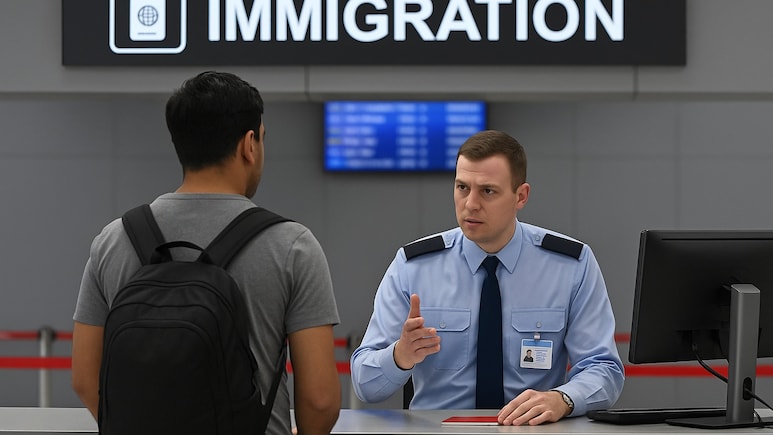
- A group of 56 Indians were allegedly mistreated by Georgian border officials at Sadakhlo crossing
- Travellers claimed they were detained over five hours without food or toilet access, passports seized
- Here's what you should do if you ever face a similar situation
A social media post has been making waves after it alleged that a group of 56 Indian citizens were mistreated by Georgian border officials at the Sadakhlo crossing from Armenia. Shared on Instagram by Dhruvee Patel, the post claimed the travellers were detained for more than five hours without food or toilet access. Their passports were allegedly seized, and they were filmed "like criminals" before being forced to sit outside in the cold. Patel described the incident as humiliating, stating that officials dismissed their valid e-visas as "wrong."
The allegations have not been independently verified, and there has been no immediate response from India's Ministry of External Affairs. Still, the post triggered strong reactions online, with many users recalling similar experiences and criticising the treatment. While international travel is usually smooth, there are cases where people are denied entry, questioned for hours, or detained without proper explanation. For Indian travellers, it is crucial to know what to do in such situations.
10 Things To Do If You Face Detention Or Mistreatment Abroad
1. Stay Calm And Know Your Rights
Being stopped at immigration or held by authorities can feel overwhelming, but reacting aggressively often worsens the situation. Remain polite and composed. Under international law, including the Vienna Convention on Consular Relations, you have the right to contact your embassy or consulate if detained. Clearly and firmly request consular access.
2. Contact The Indian Embassy Or Consulate Immediately
Every Indian mission abroad operates emergency helplines. Save the contact details of the embassy or consulate before your trip. If you are detained, request that officials inform the mission on your behalf. Consular officers can contact your family, provide legal or medical assistance, and monitor your condition. If released and able to access the internet, you may also reach out through official social media handles.
Also Read: How Europe's Digital Entry/Exit System (EES) Will Affect Indians And Other Travellers
3. Do Not Sign Anything You Do Not Understand
Authorities may pressure you to sign documents in a local language. Politely refuse until you have an interpreter or lawyer. Signing something you cannot read may be interpreted as an admission of guilt. Always request a translation or wait until a consular representative arrives.
4. Keep Detailed Documentation Of The Incident
If you experience mistreatment, such as denial of food or verbal abuse, note down names, times, and locations wherever possible. Collect copies of paperwork, receipts, or medical records if safe to do so. This documentation will support the embassy in pursuing your case and can also serve as evidence for legal action.
5. Use Official Platforms To Report Complaints
Once you are safe, lodge a written complaint with the Indian embassy. You can also register your case on the Ministry of External Affairs' MADAD portal or helpline. These official systems help track grievances and escalate them. Additionally, depending on the country, you may also approach the local ombudsman or human rights bodies.
6. Understand The Role Of Embassies
Embassies provide crucial support, such as contacting your family, arranging lawyers, or visiting you in detention. They can also ensure you are treated fairly. However, they cannot override local laws, pay fines on your behalf, or guarantee release if you are convicted. Their role is to safeguard your rights within the local legal framework.
7. Inform Family Or Friends Quickly
If you can access a phone, contact someone you trust. Share your location, the name of the airport or facility, and embassy contact details. This ensures that even if communication breaks down, someone else can notify the mission.
8. Take Preventive Measures Before Travelling
Preparing well before your journey can prevent many issues:
- Read the latest travel advisories issued by the Ministry of External Affairs.
- Keep visas, hotel bookings, and return tickets ready to present at immigration.
- Inform the local Indian mission if you are staying long-term so they can locate you in emergencies.
- Purchase travel insurance that covers legal and medical costs.
- Carry photocopies or digital scans of important documents separate from originals.
9. Seek Legal Assistance If Needed
If your detention goes beyond routine questioning, request a lawyer. Embassy officials or local legal aid groups can connect you with reliable representation. A lawyer ensures you are not forced into making false admissions or unfairly targeted.
Also Read: US Tightens Visa Rules: Indian Travellers To Face Longer Waiting Times
10. Stay Alert And Respect Local Laws
Being aware of cultural norms and legal rules can help you avoid unnecessary trouble. Avoid shortcuts or unauthorised offers at immigration checkpoints. Always use official, documented processes for entry, employment, or study abroad.
Travelling abroad can be enriching, but preparation is key. If you face detention or mistreatment, remember that international law and Indian missions exist to protect your rights. Knowing what to do in such situations ensures you are not left vulnerable in a foreign land.
Track Latest News Live on NDTV.com and get news updates from India and around the world

